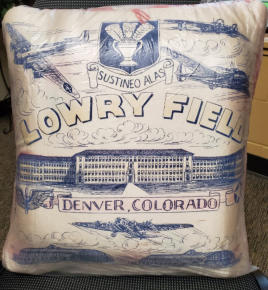


HISTORY
Lowry Air Force Base served our country for more than half a century preparing military warriors for all branches of the U. S. and Allied Forces. During its 57-year span, military personnel acquired technical skills to sustain Air Force operations through World War II, the Korean War, the Cold War and Vietnam. While Lowry sustained aerial operations from 1938 to 1966, its original primary focus was to provide aerial photography and armaments technical training. During World War II Lowry’s tasking to provide increased trained personnel to the U. S. military resulted in the base population reaching 20,000, operating three shifts, seven days a week, twenty-four hours a day. Missile technology came to the forefront by the 1950’s, with missile specialists being trained at a rate of 1,000 per year at Lowry. The Lowry Air Force Base motto, Sustineo Alas (“Bears Wings, or “I Sustain the Wings”), may be seen on many of the remaining historical buildings on Lowry to this day. Also during the 1950’s Lowry AFB became President Dwight “Ike” Eisenhower’s Summer White House. As First Lady Mamie Doud Eisenhower’s family lived in Denver she would often accompany Ike during his summer visits. The Eisenhowers would travel to Lowry on the presidential aircraft named “The Columbine” after Colorado’s State Flower. The first couple would attend services at Chapel Number 1. The United States Air Force Academy was established and located at Lowry AFB from 1955 to 1958 while the permanent campus was being constructed in Colorado Springs. More Lowry history: • In the 1840’s and 1850’s as many as 1,500 Arapahoe Native Americans set up camp along Westerly Creek on land which would eventually be occupied by Lowry AFB. • In 1888 Lowry’s northwest neighborhood was home to Jarvis Hall, a Christian military school, which burned to the ground in 1901 from a chemistry project gone wrong. Jarvis Hall was never rebuilt. • From 1904-1932, Lowry was home of the Agnes C. Phipps Memorial Sanatorium, a 150-bed facility boasting the curative properties of Colorado’s climate. The oldest structure at Lowry, built in 1904 and still in use, was a part of the original Sanatorium campus. It is now a private residence located at 7400 E. 6th Ave. • Lowry Field and Lowry AFB each were named after Lt. Francis B. Lowry, killed in 1918 during aerial combat while serving in France as an aerial photographer with the U. S. Army Air Service. Lt. Lowry was laid to rest in Fairmount Cemetery just south of Lowry at Alameda and Quebec. His grave is marked by a large monument that may still be seen today, nearly 100 years later. • Charles Lindbergh landed at Denver’s original Lowry Field located at 38th and Dahlia on August 31, 1927 during a publicity tour undertaken after completing his historic 33.5 hour 3,500 mile cross-Atlantic flight on the 21st May of 1927. Lowry Air Force Based closed in 1994 after graduating more than 1.1 million students. The base has since been redeveloped into the master-planned community we still refer to as “Lowry” today. Several original Lowry Air Force Base structures, including two aircraft hangars, were creatively re-purposed and are still in use, contributing to the rich sense of history we continue to enjoy. If you would like to read more about Lowry’s history, we highly recommend this page’s source material. You may also want to peruse the Historic Buildings Photo Album for a look at Lowry’s past and the Historic Buildings Re-purposed to see the modern rendition. To view a map of all the historic buildings and to learn more about each of them please visit the Neighborhood Directory by clicking here . Lowry has more then eighteen pieces of public art, created by artists from across Colorado contributing to the beauty, the history, and the culture at Lowry. The Lowry Foundation are the curators of all of the public art displayed at Lowry. Learn more about Lowry’s public art and see photos on the Public Art page. Sources: • Lowry Air Force Base: Images of America by Jack Stokes Ballard, John Bond and George Paxton may be purchased online at Amazon.com , purchased locally at Wings Over the Rockies Museum in Lowry or may be checked-out at Lowry’s Schlessman Public Library . • Lowry: Military Base to New Urban Community by Thomas J. Noel and Chuck Woodward may be purchased through the Lowry Foundation . • Strategic Air Command – Lowry Air Force Base
LOWRY AFB
The History
Last Updated: 11/13/2019 08:25
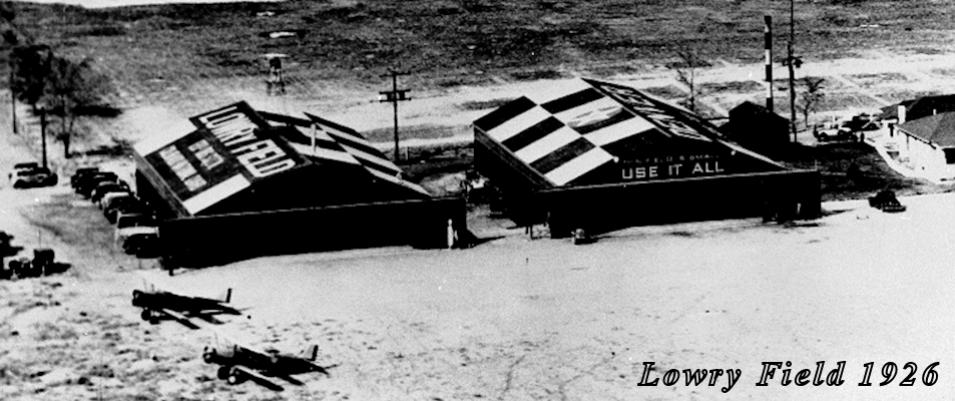
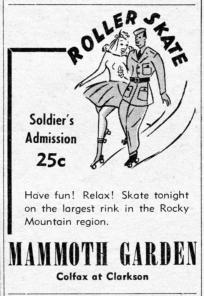
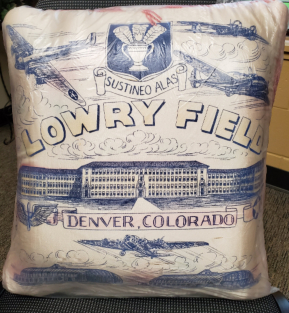
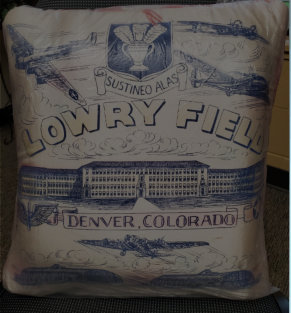




HISTORY
Lowry Air Force Base served our country for more than half a century preparing military warriors for all branches of the U. S. and Allied Forces. During its 57-year span, military personnel acquired technical skills to sustain Air Force operations through World War II, the Korean War, the Cold War and Vietnam. While Lowry sustained aerial operations from 1938 to 1966, its original primary focus was to provide aerial photography and armaments technical training. During World War II Lowry’s tasking to provide increased trained personnel to the U. S. military resulted in the base population reaching 20,000, operating three shifts, seven days a week, twenty- four hours a day. Missile technology came to the forefront by the 1950’s, with missile specialists being trained at a rate of 1,000 per year at Lowry. The Lowry Air Force Base motto, Sustineo Alas (“Bears Wings, or “I Sustain the Wings”), may be seen on many of the remaining historical buildings on Lowry to this day. Also during the 1950’s Lowry AFB became President Dwight “Ike” Eisenhower’s Summer White House. As First Lady Mamie Doud Eisenhower’s family lived in Denver she would often accompany Ike during his summer visits. The Eisenhowers would travel to Lowry on the presidential aircraft named “The Columbine” after Colorado’s State Flower. The first couple would attend services at Chapel Number 1. The United States Air Force Academy was established and located at Lowry AFB from 1955 to 1958 while the permanent campus was being constructed in Colorado Springs. More Lowry history: • In the 1840’s and 1850’s as many as 1,500 Arapahoe Native Americans set up camp along Westerly Creek on land which would eventually be occupied by Lowry AFB. • In 1888 Lowry’s northwest neighborhood was home to Jarvis Hall, a Christian military school, which burned to the ground in 1901 from a chemistry project gone wrong. Jarvis Hall was never rebuilt. • From 1904-1932, Lowry was home of the Agnes C. Phipps Memorial Sanatorium, a 150-bed facility boasting the curative properties of Colorado’s climate. The oldest structure at Lowry, built in 1904 and still in use, was a part of the original Sanatorium campus. It is now a private residence located at 7400 E. 6th Ave. • Lowry Field and Lowry AFB each were named after Lt. Francis B. Lowry, killed in 1918 during aerial combat while serving in France as an aerial photographer with the U. S. Army Air Service. Lt. Lowry was laid to rest in Fairmount Cemetery just south of Lowry at Alameda and Quebec. His grave is marked by a large monument that may still be seen today, nearly 100 years later. • Charles Lindbergh landed at Denver’s original Lowry Field located at 38th and Dahlia on August 31, 1927 during a publicity tour undertaken after completing his historic 33.5 hour 3,500 mile cross-Atlantic flight on the 21st May of 1927. Lowry Air Force Based closed in 1994 after graduating more than 1.1 million students. The base has since been redeveloped into the master-planned community we still refer to as “Lowry” today. Several original Lowry Air Force Base structures, including two aircraft hangars, were creatively re-purposed and are still in use, contributing to the rich sense of history we continue to enjoy. If you would like to read more about Lowry’s history, we highly recommend this page’s source material. You may also want to peruse the Historic Buildings Photo Album for a look at Lowry’s past and the Historic Buildings Re- purposed to see the modern rendition. To view a map of all the historic buildings and to learn more about each of them please visit the Neighborhood Directory by clicking here . Lowry has more then eighteen pieces of public art, created by artists from across Colorado contributing to the beauty, the history, and the culture at Lowry. The Lowry Foundation are the curators of all of the public art displayed at Lowry. Learn more about Lowry’s public art and see photos on the Public Art page. Sources: • Lowry Air Force Base: Images of America by Jack Stokes Ballard, John Bond and George Paxton may be purchased online at Amazon.com , purchased locally at Wings Over the Rockies Museum in Lowry or may be checked-out at Lowry’s Schlessman Public Library . • Lowry: Military Base to New Urban Community by Thomas J. Noel and Chuck Woodward may be purchased through the Lowry Foundation . • Strategic Air Command – Lowry Air Force Base
Lowry AFB
The History

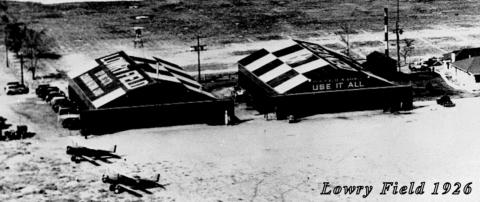
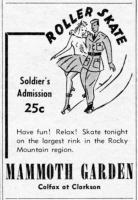
Last Updated: 11/13/2019 08:26
